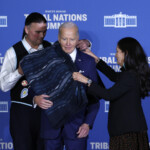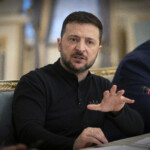The military chief leading Syria’s rebel forces who ousted President Bashar al-Assad’s regime has roots in Islamic extremist groups — including past ties al Qaeda.
Now, Abu Mohammed al-Jolani — who has a $10 million bounty on his head after the US designated the HTS as a terror group in 2018 — has attempted to portray himself as a changed man.
He is vowing to bring an open, multicultural government to the war-torn nation as he tries to garner favor from the West.
But, it could all be “a smoke show,” warned Colin Clarke, a counter-terrorism expert at the New York-based Soufan Group.
“It’s clear he’s been trained in PR and he comes off super polished,” Clarke told The Post about al-Jolani’s first interview with CNN last week.
“He appears like a moderate, but he could just be saying all the right things the US wants to hear,” Clarke added. “Will he actually keep it up when he’s in power, and will the hardened jihadists on his side follow?”
The child of Syrian exiles, al-Jolani was born Ahmed Hussein al-Shara before adopting a different name to lead HTS.
He joined al Qaeda in 2003 to fight the US occupation of Iraq, with the young extremist spending several years in a US prison, according to Arab media.
His name then re-emerged in 2012 during the Syrian Civil War as the leader of the Nusra Front, an al Qaeda affiliate opposing Assad’s government.
During the brutal war, al-Jolani adopted his current name and eventually broke ties with al Qaeda to try to legitimize HTS and the fight against the regime.
“A person in their 20s will have a different personality than someone in their 30s or 40, and certainly someone in their 50s. This is human nature,” al-Jolani told CNN during his interview — his first with western media in years.
During his CNN interview, al-Jolani opted to use his old name instead of his nom de guerre, with the HTS leader assuring Syrians that his rule would be different than Assad’s.
Al-Jolani has promised to allow Christians and other religious and ethnic minorities in Syria to live safely in the country without the fear of genocide.
“No one has the right to erase another group. These sects have coexisted in this region for hundreds of years, and no one has the right to eliminate them,” he said.
Clarke, however, pointed out that HTS has been accused of human rights violations in the small enclave it controlled in Idlib before taking over large parts of the country last week.
“HTS has been accused of torture, detaining dissidents and other human rights abuses,” he said. “The US could work with him… but there are international laws that could get in the way.”
Sarah Zaaimi, an expert on the Middle East and senior fellow for the Washington-based Atlantic Council think-tank, said al-Jolani is focusing on his image and has been issuing orders to his men to distance themselves from radical Islamist groups.
“Jolani gave instructions not to desecrate shrines and minority cultural heritage sites, such as the Sayyeda Zaynab sanctuary,” Zaaimi said in a statement, noting it was the very shrine ISIS militants vandalized during the civil war.
The group’s leadership also issued a notice banning all its troops from interfering with how women dress — a clear jab at Iran and ISIS and departure from the strict religious dress code.
Clarke said the incoming Trump administration should be ready to deal with the situation in Syria on Day One, calling on the president-elect to have a clear policy in place for US-Syrian relations.
Israel, America’s main ally in the region, is not taking any chances with al-Jolani, as the Jewish state is currently busy bombing Assad’s military equipment out of fear that it could fall into the rebels’ hands, according to the KAN public broadcaster.
Israeli Prime Minister Benjamin Netanyahu said Sunday that Israeli forces quickly captured Syrian positions along the border to “ensure that no hostile force embeds itself right next to the border of Israel.”
Israel also bombed sites within the capital itself, including a security complex and a government research center that it said Iran had previously used to develop weapons.








